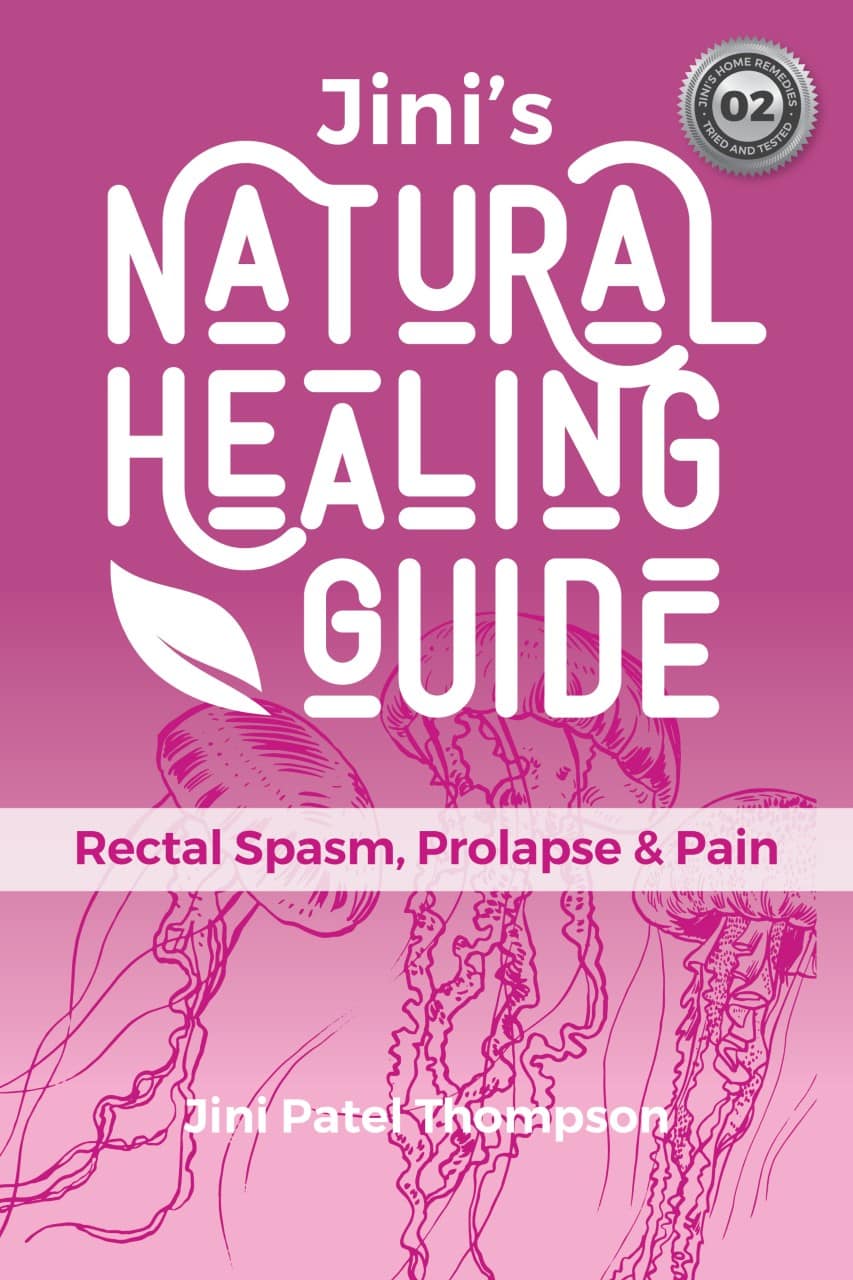
Jini’s Natural Healing Guide: Rectal Spasm, Prolapse & Pain
In this book, Jini Patel Thompson presents a number of helpful techniques for relieving rectal prolapse, pudendal nerve entrapment, and cramping or spasming levator ani muscles (the muscles surrounding your rectum) – also known as anal spasm or rectal spasm.
Also available on Amazon Kindle or as a Printed Book
HOW CAN THIS BOOK HELP YOU?
The anorectal canal is supported by a girdling of muscles and ligaments, with the pudendal nerve running throughout these muscles. Following childbirth, chronic constipation, anal sex, pelvic or surgical trauma, you can develop muscle, nerve, tendon or ligament strains in related tissues or organs. These issues can contribute to rectal spasm, pain, and sometimes prolapse.
Jini Patel Thompson gives you detailed instructions and various techniques you can use to relax the rectal muscles, release trapped nerves, facilitate easier, gentler bowel movements, support the rectum, and ease the pain. She also helps you explore your mind/body/soul interface: The rectum is the last tube of connection between our inner and outer worlds. Any incongruence between our inner soul, emotions, wisdom, and the way we present or act in the world, shows up here.
Details, dosages and full instruction for each of these techniques are given in the book.
RECTAL SPASM
The root cause of rectal spasm is tension in the pelvic muscles including the levator ani muscle. The levator ani is a broad, thin muscle inside the pelvis that tightens and relaxes to aid in a number of bodily functions, including bowel movements. Levator ani syndrome has been described as “a chronic charlie-horse up inside the pelvis”. Pelvic floor muscle spasms can also cause tightness, burning, and a sensation that the rectum is full.
Sometimes the pelvic muscle spasm is caused by a trapped nerve or ligament, or some sort of adhesion or restriction in your pelvis. Levator ani pain tends to be constant and centered in (but not restricted to) the levator ani muscle, while proctalgia fugax pain is a short, stabbing pain in the rectum.
RECTAL PROLAPSE
Rectal prolapse occurs when the tissue that lines the rectum falls down into or sticks out through the anal opening. Rectal prolapse can start off by protruding only during bowel movements; then it may protrude during sneezes or other abdominal contractions; then progress to protruding during activities like walking, and eventually it may reach chronic protrusion, where the rectum fails to retract at all.
PNE & PELVIC PAIN
Causes of pudendal nerve entrapment include pregnancy, accidents, infection and inflammation, and scarring from surgery or surgical mishaps. Scar tissue is not as flexible as healthy tissue, and the gradual build-up and thickening of scar tissue can narrow and constrict the anal or rectal canal, resulting in a stricture, compressed ligaments, or compressed or trapped pudendal nerve.
The pudendal nerve can also fuse or adhere to different parts of the anatomy, or become trapped, or pinched – therefore sending pain signals. Remember that pain is the body’s way of alerting you to a problem that needs your help to resolve.
As a result of the pudendal nerve triggering or firing repeatedly, you may also experience cramping and pain throughout your levator ani muscles – remember that the pudendal nerves spread throughout those muscles.
Note: We also have a number of other books or products for very specific digestive and rectal conditions (anal stenosis & stricture, hemorrhoids, anal fissure, perianal abscess and fistula, etc.) so be sure to choose the best one for your particular condition(s).
eBook Length: 51 pages, 8.5″x 11″
Also available on Amazon Kindle or as a Printed Book
